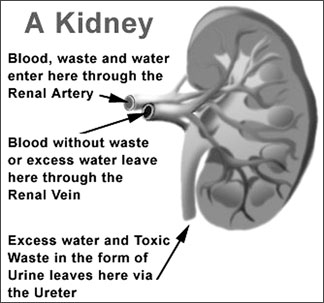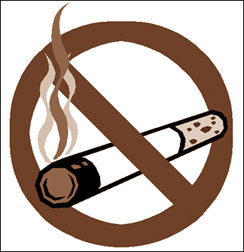|

Kidney failure:
Another silent blow
by Shanika SRIYANANDA
The shocking news about an unusual rise in chronic kidney disease
(CKD) in Anuradhapura, Medawachchiya, Dehiattakandiya and Padaviya in
the North central province, has sent shock waves across the country
alarming people about an impending health problem.
 Still remains a mystery why there is an alarming number of CKD cases
reported from this province, the government has sort international
experts assistance to discover the causes for the rise. Still remains a mystery why there is an alarming number of CKD cases
reported from this province, the government has sort international
experts assistance to discover the causes for the rise.
A WHO team is now investigating the issue.
With eyes closed all of them, connected to different machines, were
struggling between life and death. Their survival is totally dependent
on the machines which purify their blood. The machines have started
doing the work of that of the kidneys.
Unaware of the exact reason as to why their kidneys are
malfunctioning and unable to remove waste products from the blood, these
patients lie on beds for hours until the machines try to clean blood
circulation. Can regular medication for diabetes and high blood pressure
can lead to kidney disease?
“Not exactly but the whole system of medication has been abused by
the patients as they tend to purchase some high pain killers and certain
antibiotics over the counter”, Consultant Nephologist of the Colombo
National Hospital Dr. A.L.M. Nazar said.
According to Dr. Nazar, overuse of these drugs for a long period of
time would cause kidney failure. “In some cases when the risk of
diabetes and hypertension were reduced the patients continue with the
same dose of medication and this is risky”, he said.
Dr. Nazar said that according to analysis and the other disease
patterns compared to the world figures, 10 percent of the adult
population was suffering from some sort of kidney disease.
Nearly four percent of the adult population who has kidney failure
are below the age of 60 years.
According to Dr. Nazar when the kidneys are partly or completely
cease its ability to lose their ability to remove waste products and
excess water from the blood then it is called kidney failure. carry out
normal functions.
“Under this situation water, waste, and toxic substances which are
removed by the kidneys will stock in the body. This is the danger of the
disease”, he said adding that this situation would also cause anaemia,
excessive acidity of body fluids, fatty acids and bone diseases.
Chronic kidney disease, he said that it was beyond recovery and
needed dialysis treatment or transplantation. Dr. Nazar said that unlike
CKD, acute kidney failure which develops rapidly over the days or weeks
is usually does not cause permanent damage to the kidneys. “In most
cases the acute kidney failure is recoverable”, he added.
Dr. Nazar said that the major causes for kidney failure are diabetes
and high blood pressure, which is very common now in Sri Lanka.
People, whose lifestyles have been changed rapidly, with the changing
world face a challenge today. They need to control their diabetes and
hypertension to avoid future repercussions.
“Kidney failure is common but people lack awareness that the disease
is preventable”, he said adding that the best advice that he could give
is that to give more concern about lifestyle changes and to stick to
medical advice rather than rushing for self medication.
According to Dr. Nazar most of the kidney patients do not die due to
kidney failure but as a result of heart complications. “The patients
with kidney failure is 30 times more prone to cardiac aliments than a
normal person”, he said.
No need to wait until the disease becomes a disaster. According to
Dr. Nazar, early screening through a simple blood test can avert a
death. The pathetic about this disease is that people do not know that
their kidneys are not normal until their kidney function is cease to
over 80 per cent.
While the state expenditure for treating kidney patients runs into
billion of rupees, it needs over Rs. 350,000 to keep a patient alive on
dialysis.
Apart from this the expenses for drugs and other expenses to be borne
by the family ,it cost a huge amount of money which is beyond the
family’s reach. In this light, awareness is the best solution to prevent
more people prone to the disease.
***************
Know your kidney functions
They are two bean-shaped organs that are on the left and right sides
of the spine in the lower middle back. The weight of a kidney is 113.5
grams and has over one million filtering units.
The kidneys are connected to the urinary bladder by tubes called
ureters. Urine is stored in the urinary bladder until the bladder is
emptied by urinating. The bladder is connected to the outside of the
body by another tube like structure called the urethra.
The main function of the kidneys is to remove waste products and
excess water from the blood. The kidneys process about 200 litres of
blood every day and produce about two litres of urine.
The waste products are generated from normal metabolic processes
including the breakdown of active tissues, ingested foods, and other
substances.
The kidneys allow consumption of a variety of foods, drugs, vitamins
and supplements, additives, and excess fluids without worry that toxic
by-products will build up to harmful levels. The kidney also plays a
major role in regulating levels of various minerals such as calcium,
sodium, and potassium in the blood.
Chronic kidney disease causes
Although chronic kidney disease sometimes results from primary
diseases of the kidneys themselves, the major causes diabetes and high
blood pressure.
* Type 1 and type 2 diabetes mellitus cause a condition called
diabetic nephropathy, which is the leading cause of kidney disease in
the United States.
* High blood pressure (hypertension), if not controlled, can damage
the kidneys over time.
* Glomerulonephritis is the inflammation and damage of the filtration
system of the kidneys and can cause kidney failure.
Chronic Kidney Disease Symptoms
* Fatigue and weakness (from anaemia or accumulation of waste
products in the body)
* Loss of appetite, nausea and vomiting
* Need to urinate frequently, especially at night
* Swelling of legs and puffiness around the eyes (fluid retention)
* Itching, easy bruising, and pale skin (from anaemia)
* Headaches, numbness in the feet or hands
* Disturbed sleep,
* High blood pressure,
* Chest pain due to pericarditis (inflammation around the heart)
* Shortness of breath from fluid in lungs
* Bleeding (poor blood clotting)
* Bone pain and fractures
* Decreased sexual interest and erectile dysfunction
When to Seek Medical Care
Several signs and symptoms may suggest complications of chronic
kidney disease. If experience any of the following symptoms:
* Change in energy level or strength
* Increased water retention (puffiness or swelling) in the legs,
around the eyes or in other parts of the body
* Shortness of breath or change from normal breathing
* Nausea or vomiting
* Light-heatedness
* Severe bone or joint pain
* Easy bruisability
* Itching Better to consult a doctor.
Source:www.medicinenet.com
Psychological management of depression and anxiety in pregnancy
by Dr. R. A. R. Perera, Consultant Psychologist.
There is an emerging literature suggesting that depression and
anxiety in pregnancy may be associated with poorer neurological and
behavioral outcomes in the child.
For women most psychological disorders will rise in the childbearing
years with a two to three fold onset of new cases in the first few weeks
after childbirth.
While earlier reports claimed that pregnancy was a time of relative
mental well being, it appears that prevalence of depression is more
during this period (10% at 24 weeks and 13% at 32 weeks).
In women with significant antenatal depression (depression during
pregnancy) there are associated risks for the unborn baby by way of:
* Maternal suicidal behaviour
* Associated drug abuse or alcohol abuse
* Poor antenatal clinic attendance or self care
* Inadequate nutrition
The negative impact of postpartum (after the child birth) depression
on the early mother-infant relationship and on the child’s social,
emotional and behavioral development is well documented.
Significant proportion of these women would have been depressed from
pregnancy onward. Clearly it would be best for both mother and child to
treat depression and anxiety from pregnancy onward.
In light of the above, it becomes clear that assessing maternal
mental health is a key component of good antenatal care. This is
especially important, as maternal mental health will impact on the
quality of parenting and attachment achieved in the developmentally
crucial first year of the infant’s life.
It is important to be aware that the dysfunctional personality styles
of some women may become more at this time as unresolved emotions
arising from a history of neglect and abuse become activated. Without
appropriate support and intervention at this critical time, these
patterns of abuse and neglect may continue to be repeated in the next
generation.
Risk factors of antenatal depression:
* Past history of depression and anxiety disorder or other
psychological conditions
* Past history of abuse or poor parental care
* Poor quality of relationship with or absence of a partner
* Domestic violence (past or present)
* Current major stressors or losses
* Drug and alcohol abuse
* Low self esteem, dysfunctional personality or coping style
The more risk factors the more support and interventions a mother
will need, irrespective of the presence of current symptoms.
Psychologists use a scale called the Edinburgh Postnatal Depression
Scale, to asses the amount of depression a woman might be suffering
from. This will include questions about:
* Current mood (depressed, irritable or anxious)
* Loss of interest, social withdrawal
* Loss of self esteem and depressive thoughts
* Panic attacks or agoraphobia
* Sense of hopelessness or suicidal plans
Sleep, energy and appetite are variable during pregnancy and
therefore are less reliable to detect depression or anxiety disorders.
Self-harming behaviour, often in the context of volatile
interpersonal relationships or domestic violence and history of abuse or
inadequate parenting should alert the psychologist of a personality
dysfunction.
These women need intensive counselling, as they are likely to have
ongoing problems in attaching securely with their infant and in some
cases may be unable to provide a safe environment for the child.
In the treatment, it is very important to meet the partner to Asses
their attitude to the pregnancy, level of support and/or conflict within
the relationship.
In mild to moderate depression or anxiety, or for those with low
self-esteem, supportive counselling, cognitive behavioral therapy,
breathing exercises or stress management will be beneficial.
In moderate to severe depression or panic disorder, antidepressant
drugs have to be used. The issue of drug use in pregnancy remains a
matter of assessing the risk-benefit ratio for individual cases. Studies
conducted in US and Australia has shown that there is no increase in the
rate of major congenital abnormalities above the usual risk in the
general population.
There was also no increase in behavioral deficits or developmental
delays compares to non-exposed children of depressed mothers.
It is good to use the minimum effective dosage and reduce the dose in
the week before delivery and observe for withdrawal symptoms in the
first few days after delivery. The breastfed child will need to be
monitored for adverse reactions.
In Sri Lanka, the benefits of implementing good mental health care
before a child is born may have long lasting benefits for the mother,
infant, family and to the whole society.
Family Health Centre celebrates first anniversary
The Family Planning Association of Sri Lanka (FPASL) is the pioneer
in providing reproductive and sexual health services to the public. It
was established in 1953.
The FPA Clinic which was started in 1971 to provide family planning
services to the community was refurbished and opened on the 15th of May
2007 as the Centre for Family Health offering many additional services
including family planning services.
The centre provides services to all clients irrespective of age or
marital status.
The services range from GP consultations, counselling for sexual,
family and social issues. The more sophisticated services include sub
fertility assessments including Intra Uterine Insemination.
The clinic is known for the personalized services offered by
dedicated professional and technical staff. The health services are
available at a reasonable cost.The services offered by the clinic:
Reproductive health consultations
GP consultations, counselling, Premarital contraception,
psychological sexual problems, family issues, social issues, sub
fertility services, contraception Services, well woman/female screening,
male screening, laboratory facilities, pharmacy, workshops/lectures,
sexual & reproductive health relaxation.
Smoking ‘triggers deadly changes’
A key mechanism by which smoking triggers genetic changes that cause
lung cancer has been unravelled.
 Researchers have shown exposure to cigarette smoke slows production
of a protein called FANCD2 in lung cells. This protein plays a key role
in repairing damage to DNA, and causing faulty cells to commit suicide
before they go on to become cancerous. The study, led by Oregon Health
and Science University, appears in the British Journal of Cancer. Researchers have shown exposure to cigarette smoke slows production
of a protein called FANCD2 in lung cells. This protein plays a key role
in repairing damage to DNA, and causing faulty cells to commit suicide
before they go on to become cancerous. The study, led by Oregon Health
and Science University, appears in the British Journal of Cancer.
Lung cancer
Most common cancer in the world with 1.3 million people diagnosed
every year. Second most common form of cancer in the UK after breast
cancer. Over 38,300 new cases, and more than 33,000 deaths in the UK
each year. Smoking responsible for 90% of cases in the UK. It raises
hopes of improved treatments for the disease.
Lead researcher Dr. Laura Hays said: “These findings show the
important role FANCD2 plays in protecting lung cells against cigarette
smoke and may explain why cigarette smoke is so toxic to these cells.”
The researchers suspect other proteins also play a role in fixing DNA
and weeding out defective cells. However, their work showed that cells
with very high levels of FANCD2 were resistant to the toxic effects of
smoke - suggesting this protein is key.
Artificial windpipe
The researchers created an artificial windpipe in the lab to
replicate the environment of a smoker’s lung. They then studied the
effects of cigarette smoke on different proteins in cells and found that
FANCD2 levels were low enough to allow DNA damage.
FANCD2 is part of a family of proteins involved in an inherited
condition called Fanconi anaemia. People with the condition are more
likely to develop cancers at a young age and have low levels of these
proteins.
Dr. Lesley Walker, director of cancer information at Cancer Research
UK, said: “This interesting piece of science adds to our understanding
of why smoking is so deadly.
“Smoking is the single biggest preventable cause of cancer and causes
nine out of ten cases of lung cancer.
“But the good news is that quitting works - after five years without
smoking your risk of a heart attack will have fallen to half that of a
smoker.
“And after ten years your risk of lung cancer will have halved too.”
- BBC NEWS
|
